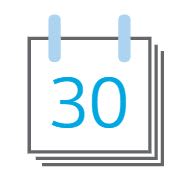WHAT TO CONSIDER WHEN TAX PLANNING FOR EOFY
 With the end of the financial year looming, it’s time to think about your tax planning options before 30 June 2023 hits.
With the end of the financial year looming, it’s time to think about your tax planning options before 30 June 2023 hits.
We’ve curated a list of top things to focus on when organising your tax affairs for the 2023 year-end, applicable to businesses, primary producers, trusts and individuals.
INDIVIDUAL TAX PLANNING
The most commonly overlooked deductions that could reap big refund rewards.
Welcome to our comprehensive guide on individual tax planning for the 2022-23 End of Financial Year (EOFY). As the financial year comes to a close, it's crucial to proactively assess your tax situation and explore opportunities for maximising deductions, minimising liabilities, and optimising your overall tax position.
Whether you are a business owner, a high-income earner, or an individual with various investments, our aim is to empower you with the knowledge and tools necessary to make informed decisions about your tax obligations. From identifying commonly overlooked deductions to exploring tax-efficient investment options, we cover a wide range of topics tailored specifically to the needs of individuals like you.
10 Tips for Individuals this 2022-23 EOFY

Bring forward deductions
 Taxpayers who own an investment property or have an investment portfolio margin loan may consider prepaying interest up to 12 months in advance (service period ending prior to 30 June 2023) on investment loans and claiming a deduction in the 2022 year for the prepayment.
Taxpayers who own an investment property or have an investment portfolio margin loan may consider prepaying interest up to 12 months in advance (service period ending prior to 30 June 2023) on investment loans and claiming a deduction in the 2022 year for the prepayment.

Work from home expenses
The ATO have revised the fixed rate method to calculate work from home expenses and has changed the requirements of records required to keep. Speak to your RSM Advisor for more details.

Motor vehicle claims
If you frequently use your own vehicle for work related travel, a logbook may increase your motor vehicle deduction.
A logbook must be kept for 12 consecutive weeks and must be updated every five years or whenever your vehicle use materially changes. In addition to maintaining a logbook ensure you keep written evidence of all motor vehicle expenses such as insurance, services, license and registration paid during the 2023 financial year. If you do not maintain a logbook the maximum kilometres an employee will be entitled to claim is 5,000 kilometers at a rate of 72 cents for the 2021-22 financial year.
It is important to note, in most cases, home to work travel is not included as work related.

Donations
A donation to a Deductible Gift Recipient (DGR) may be a great way to reduce your taxable income while contributing to a good cause.
If you intend to make a donation prior to 30 June 2023, ensure that the donation is made to a DGR and that you maintain the receipt. A list of DGRs are available on the ATO’s website.

Income protection policy
If your income protection policy is owned by you personally it is an income tax deduction in your individual tax return.
![]()
It may be wise talking to your financial adviser about your income protection policy being in your personal name instead of your superannuation fund to result in a personal tax deduction. In addition, to increase your deduction it may be beneficial to pay your policy annually prior to year-end instead of monthly.

Managing capital gains exposure
You may consider reviewing any capital gains made during the financial year. If you have had a capital gains tax event during the year, evaluate any other assets you hold that are in a loss position and consider if it is an appropriate time to sell these to reduce your capital gains tax exposure.
Be aware that individuals have access to the 50% capital gain concession if they hold an asset for more than 12 months.

Superannuation contributions – Concessional contributions
Just before the financial year end is a great time to do a financial check of your funds and if you have any excess cash it might be worthwhile investing in your retirement and topping up your superannuation fund.
Any concessional contributions made into your superannuation fund up to the cap of $27,500 is an income tax deduction against your assessable income. Since 1 July 2017 you are now able to make concessional contributions to your superannuation fund regardless of how your income was received. This means even if you are not self-employed you can still make an eligible concessional contribution and have the amount deductible in your tax return.
The exception to this is if you are over 75 years of age.
The annual concessional contributions cap is now $27,500 for all individuals. For those with a super balance of less than $500,000 at the end of June 30 in the previous year, the new rules allow you to carry forward your unused concessional contributions cap amounts from 1 July 2018. Unused
amounts are available for a maximum of five years and expire after this.
If you have had more than one job during the financial year you should make sure that you have not exceeded your concessional contribution cap as excess contribution amounts will be taxed at the marginal tax rate plus an excess concessional contributions charge. To claim a deduction for superannuation contributions in your income tax return you must provide a signed notice (Section 290-170 notice) to your superannuation fund to notify them of your intention. You must receive an acknowledgement notice from the fund confirming your contribution, prior to the lodgement of your individual income tax return.

Non-concessional contributions (after–tax contributions)
From 1 July 2022, members under 75 years of age may be able to make non-concessional contributions subject to a yearly cap of $110,000 or up to $330,000 over a three-year period depending on their total superannuation balance
Contribution and ‘bring forward’ available to members under 75:
| Superannuation balance | Contribution and bring forward available |
| Less than $1.48 million | Access to $330,000 cap (over three years) |
| Greater than or equal to $1.48 million and less than $1.59 million | Access to $220,000 cap (over two years) |
| Greater than or equal to $1.59 million and less than $1.70 million | Access to $110,000 cap (no bring-forward period, general non-concessional contributions cap applies) |
| Greater than or equal to $1.70 million | Nil |
Members are not eligible to make non-concessional contributions once they are 75 or older.
Due to the strict rules and regulations around superannuation funds and member contributions we advise you to contact us prior to making any non-concessional contributions as excess
contributions will be taxed at 47%.

Division 293 tax on superannuation contributions
Individuals with an adjusted taxable income over $250,000 will be subject to an additional 15% tax on their taxable superannuation contributions.

Medicare levy surcharge
Singles and families who do not have adequate private health insurance cover will be liable for the Medicare levy surcharge. This is determined by the income thresholds, set out in the table below.
| No change | Threshold 1 | Threshold 2 | Threshold 3 | |
| Singles | $90,000 or less | $90,001- $105,000 | $105,000- $140,000 | $140,001 or more |
| Families | $180,000 or less | $180,001- $210,000 | $210,001- $280,000 | $280,001 or more |
| Rate | 0.0% | 1.0% | 1.25% | 1.5% |
Note: The family income threshold is increased by $1,500 for each dependent child after the first child. Ensure you have appropriate private health insurance going forward to avoid paying the Medicare levy surcharge.
GET IN TOUCH
Whether you are looking to maximise deductions, manage capital gains, explore superannuation strategies, or leverage any other tax-saving opportunities, our dedicated team is here to guide you every step of the way. We encourage you to explore the contents of this webpage and reach out if you have any further questions.
Get in touch today >>










